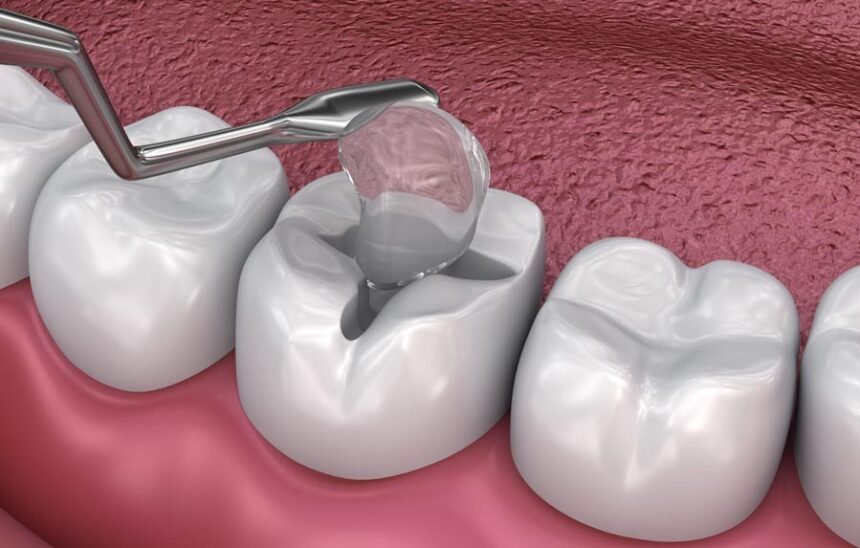Types of Dental Fillings Available in North York
When it comes to dental fillings in North York, there are several options available to suit different needs and preferences. Understanding the types of dental fillings can help you make an informed decision about which material is best for your dental health.
Amalgam Fillings
Amalgam fillings are made from a mixture of metals, including silver, mercury, tin, and copper. They are known for their durability and are often used for fillings in the back teeth where chewing pressure is greatest.
Composite Resin Fillings
Composite resin fillings are made from a mixture of plastic and fine glass particles. They are popular because they can be closely matched to the color of your natural teeth, making them a more aesthetically pleasing option.
Gold and Ceramic Fillings
Gold fillings are highly durable and can last for many years, but they are also more expensive. Ceramic fillings, made from porcelain, are another durable option that can be color-matched to your teeth. Both types offer excellent longevity and strength.
The Dental Filling Procedure: What to Expect
Initial Consultation and Examination
The first step in the dental fillings procedure is a thorough teeth inspection. During this initial consultation, your dentist will decide upon the best treatment for you. Note that a cavity filling is best suited for only minor fractures and tooth decay. If you suffer from more severe dental issues, different restorative treatments may be necessary.
The Filling Process
Once the ideal type of dental filling is determined, the dentist will begin the operation by administering a local anesthetic to prevent discomfort. Getting a dental filling doesn’t rank very high on the pain scale, but anesthetics ensure your comfort throughout the procedure. The dentist will then remove the decayed portion of the tooth and clean the area thoroughly before applying the filling material.
Post-Procedure Care
After the filling is in place, your dentist will provide instructions for post-procedure care. This typically includes avoiding hard or sticky foods for a short period and maintaining good oral hygiene practices. It’s normal to experience some sensitivity after the filling, but this should subside within a few days.
Proper post-procedure care is crucial for the longevity of your dental filling and overall oral health.
Cost of Dental Fillings in North York
Understanding the cost of dental fillings in North York is crucial for anyone considering this dental procedure. The price of a filling will depend on a variety of factors including the material used and any other services provided. It’s important to consult with your dentist to get an accurate estimate.
Factors Affecting the Cost
Several factors can influence the cost of dental fillings:
- Material Used: Different materials like amalgam, composite resin, gold, and ceramic have varying costs.
- Complexity of the Procedure: More complex cases may require additional time and expertise, increasing the cost.
- Location of the Tooth: Fillings in hard-to-reach areas may be more expensive.
- Additional Services: Any extra services like X-rays or consultations can add to the overall cost.
Insurance and Payment Options
Most dental insurance plans cover a portion of the cost of dental fillings. It’s advisable to check with your insurance provider to understand what is covered. Some clinics also offer payment plans to make the procedure more affordable.
| Insurance Type | Coverage Percentage |
| Basic Dental Plan | 50-80% |
| Comprehensive Plan | 80-100% |
Affordable Dental Care Tips
Here are some tips to make dental care more affordable:
- Regular Check-Ups: Preventive care can help avoid the need for more expensive treatments.
- Payment Plans: Many clinics offer payment plans to spread out the cost.
- Discount Programs: Look for clinics that offer discount programs for uninsured patients.
For those considering more extensive procedures like dental veneers North York or dental implants North York, understanding the cost structure for fillings can provide a good baseline for budgeting.
Common Issues with Dental Fillings and How to Address Them
Dental fillings are essential for preserving the strength of decayed teeth, but they can come with their own set of issues. Understanding these common problems and knowing how to address them can help maintain your dental health.
Discoloration of Fillings
Fillings can become discolored over time, turning into a cosmetic issue. Here are some ways to address this problem:
- Replace Your Fillings: If the discoloration is serious or lasts a long time, getting new restorations to replace the old fillings may be the best solution. The dentist will remove the old restoration and replace it with new filling material that matches the color of your teeth.
- Cover with Dental Bonding: Another option is to cover the discolored filling with dental bonding to restore its appearance.
Sensitivity After Filling
It’s common to experience sensitivity after getting a filling. This sensitivity usually subsides within a few days to a week. Here are some tips to manage it:
- Avoid Hot and Cold Foods: Stick to foods and drinks at room temperature to avoid triggering sensitivity.
- Use Desensitizing Toothpaste: Special toothpaste designed for sensitive teeth can help alleviate discomfort.
- Consult Your Dentist: If sensitivity persists, consult your dentist for further evaluation and treatment.
Filling Replacement
Over time, fillings may need to be replaced due to wear and tear. Regular dental check-ups can help monitor the condition of your fillings. Here are some signs that you may need a replacement:
- Visible Wear: If you notice visible wear or cracks in your filling, it’s time to consult your dentist.
- Pain or Sensitivity: Persistent pain or sensitivity could indicate that your filling needs to be replaced.
Regular dental check-ups are crucial for maintaining the health of your fillings and addressing any issues before they worsen.
By understanding these common issues and how to address them, you can ensure that your dental fillings continue to protect your teeth effectively.
Choosing the Right Dentist for Dental Fillings in North York
Qualifications to Look For
When selecting a dentist in North York for dental fillings, it’s crucial to consider their qualifications. Ensure the dentist is licensed and has specialized training in cosmetic dentistry. Look for certifications from recognized dental associations and inquire about their experience with various types of fillings.
Patient Reviews and Testimonials
Patient reviews and testimonials can provide valuable insights into the quality of care provided by a dentist. Check online reviews and ask for references. Positive feedback from other patients can be a good indicator of a dentist’s expertise and patient care.
Consultation and Communication
Effective communication is key to a successful dental treatment. During your initial consultation, assess how well the dentist listens to your concerns and explains the procedure. A good dentist will take the time to discuss your options and answer any questions you may have.
Choosing the right dentist is essential for a successful dental filling procedure. Make sure to do thorough research and select a dentist who meets your needs and expectations.
Preventive Measures to Avoid Cavities and Fillings
Prevention helps avoid serious and costly dental problems and is the key to having a healthy, confident, beautiful smile. Regular dental exams, cleanings, and x-rays are essential components of preventive care. Sealants and fluoride treatments also play a significant role in protecting teeth from decay.
Proper Oral Hygiene Practices
Be mindful of brushing and flossing your teeth regularly. Brush at least twice a day and floss daily. This way, you can prevent plaque and surface stains from building up on both natural teeth and fillings. Here are some tips for maintaining good oral hygiene:
- Use fluoride toothpaste.
- Replace your toothbrush every three to four months.
- Clean your tongue to remove bacteria.
- Use mouthwash to rinse away food particles.
Dietary Recommendations
Certain foods and drinks can have a staining effect on your teeth and the filling material. To avoid increasing the risk of discoloration, try not to eat or drink these foods and beverages too much and rinse your mouth out with water after consuming them. Here are some dietary tips to follow:
- Limit sugary snacks and drinks.
- Eat a balanced diet rich in fruits and vegetables.
- Drink plenty of water to keep your mouth hydrated.
- Avoid tobacco products.
Regular Dental Check-Ups
Your commitment to care for your teeth is essential to maintain dental health and preventing the onset, progression, and recurrence of dental disease. Preventive dentistry represents collaboration between you and your dentist. Regular dental check-ups typically include:
- Professional teeth cleaning.
- Comprehensive dental exams.
- X-rays to detect hidden issues.
- Application of sealants and fluoride treatments.
Regular visits to the dentist can help catch potential issues early, saving you time and money in the long run.
Advanced Technologies in Dental Fillings
In recent years, advanced technologies in dental fillings have revolutionized the way dentists approach cavity treatment and tooth restoration. These innovations not only enhance the effectiveness of the procedures but also improve patient comfort and outcomes.
Laser Dentistry
Laser dentistry is a cutting-edge technology that allows for more precise and less invasive dental procedures. Lasers can be used to remove decay, prepare the surrounding enamel, and even harden the filling material. This technology reduces the need for drills and anesthesia, making the process more comfortable for patients.
Digital Imaging
Digital imaging has transformed the diagnostic process in dentistry. High-resolution images and 3D scans provide dentists with detailed views of the teeth and surrounding structures. This technology aids in accurate diagnosis, treatment planning, and monitoring the progress of dental fillings.
Biocompatible Materials
The development of biocompatible materials has significantly improved the quality and safety of dental fillings. These materials are designed to integrate seamlessly with the natural tooth structure, reducing the risk of allergic reactions and enhancing the longevity of the fillings. Common biocompatible materials include composite resins and glass ionomer cements.
The integration of these advanced technologies ensures that patients receive the highest standard of care in dental fillings, leading to better outcomes and increased satisfaction.
Conclusion
In conclusion, dental fillings are a crucial aspect of maintaining oral health, especially in a community like North York where access to top-rated dental care is readily available. Understanding the different types of fillings, their costs, and the potential for discoloration can help you make informed decisions about your dental care. Whether you’re dealing with cavities or looking to replace old fillings, consulting with a trusted North York dentist, such as those at Pearl Dental Group, can ensure you receive the highest quality treatment. Remember, prioritizing your dental health today can prevent more severe issues in the future. Book an appointment with a North York dental clinic to discuss your options and take the first step towards a healthier, brighter smile.



